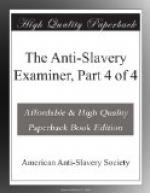In vain do we seek in nature, for the origin of this prejudice. Young children never betray it, and on the continent of Europe it is unknown. We are not speaking of matters of taste, or of opinions of personal beauty, but of a prejudice against complexion, leading to insult, degradation and oppression. In no country in Europe is any man excluded from refined society, or deprived of literary, religious, or political privileges on account of the tincture of his skin. If this prejudice is the fiat of the Almighty, most wonderful is it, that of all the kindreds of the earth, none have been found submissive to the heavenly impulse, excepting the white inhabitants of North America; and of these, it is no less strange than true, that this divine principle of repulsion is most energetic in such persons as, in other respects, are the least observant of their Maker’s will. This prejudice is sometimes erroneously regarded as the cause of slavery; and some zealous advocates of emancipation have flattered themselves that, could the prejudice be destroyed, negro slavery would fall with it. Such persons have very inadequate ideas of the malignity of slavery. They forget that the slaves in Greece and Rome were of the same hue as their masters; and that at the South, the value of a slave, especially of a female, rises, as the complexion recedes from the African standard.
Were we to inquire into the geography of this prejudice, we should find that the localities in which it attains its rankest luxuriance, are not the rice swamps of Georgia, nor the sugar fields of Louisiana, but the hills and valleys of New England, and the prairies of Ohio! It is a fact of acknowledged notoriety, that however severe may be the laws against colored people at the South, the prejudice against their persons is far weaker than among ourselves.
It is not necessary for our present purpose, to enter into a particular investigation of the condition of the free negroes in the slave States. We all know that they suffer every form of oppression which the laws can inflict upon persons not actually slaves. That unjust and cruel enactments should proceed from a people who keep two millions of their fellow men in abject bondage, and who believe such enactments essential to the maintenance of their despotism, certainly affords no cause for surprise.
We turn to the free States, where slavery has not directly steeled our hearts against human suffering, and where no supposed danger of insurrection affords a pretext for keeping the free blacks in ignorance and degradation; and we ask, what is the character of the prejudice against color here? Let the Rev. Mr. Bacon, of Connecticut, answer the question. This gentleman, in a vindication of the Colonization Society, assures us, “The Soodra is not farther separated from the Brahim in regard to all his privileges, civil, intellectual, and moral, than the negro from the white man by the prejudices which result from the difference made between them by THE GOD OF NATURE.”—(Rep. Am. Col. Soc. p. 87.)




